《中考英语》初中英语语法知识—副词的知识点复习
- 格式:doc
- 大小:45.50 KB
- 文档页数:8
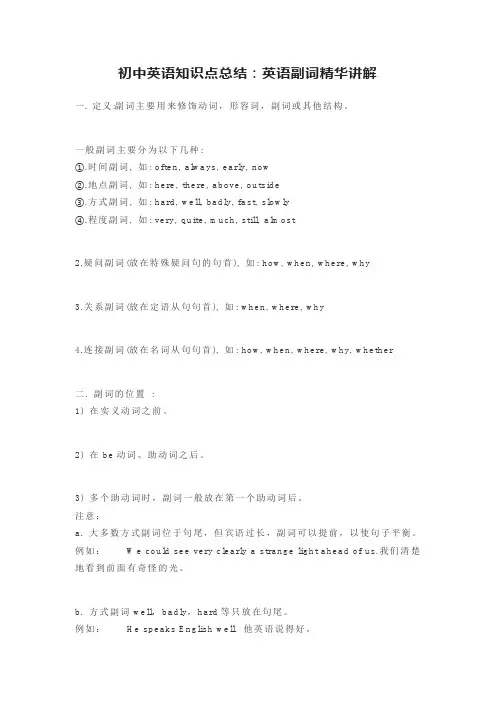
初中英语知识点总结:英语副词精华讲解一. 定义:副词主要用来修饰动词,形容词,副词或其他结构。
一般副词主要分为以下几种:①.时间副词, 如: often, always, early, now②.地点副词, 如: here, there, above, outside③.方式副词, 如: hard, well, badly, fast, slowly④.程度副词, 如: very, quite, much, still, almost2.疑问副词(放在特殊疑问句的句首), 如: how, when, where, why3.关系副词(放在定语从句句首), 如: when, where, why4.连接副词(放在名词从句句首), 如: how, when, where, why, whether二. 副词的位置:1) 在实义动词之前。
2) 在be动词、助动词之后。
3) 多个助动词时,副词一般放在第一个助动词后。
注意:a. 大多数方式副词位于句尾,但宾语过长,副词可以提前,以使句子平衡。
例如:We could see very clearly a strange light ahead of us.我们清楚地看到前面有奇怪的光。
b. 方式副词well,badly,hard等只放在句尾。
例如:He speaks English well. 他英语说得好。
三. 副词的排列顺序:1) 时间,地点副词,小单位的在前,大单位在后。
2) 方式副词,短的在前,长的在后,并用and或but等连词连接。
例如:Please write slowly and carefully. 请写得慢一些,仔细一些3) 多个不同副词排列:程度+地点+方式+时间副词。
注意:副词very 可以修饰形容词,但不能修饰动词。
改错:(错)I very like English.(对)I like English very much.注意:副词enough要放在形容词的后面,形容词enough放在名词前后都可。
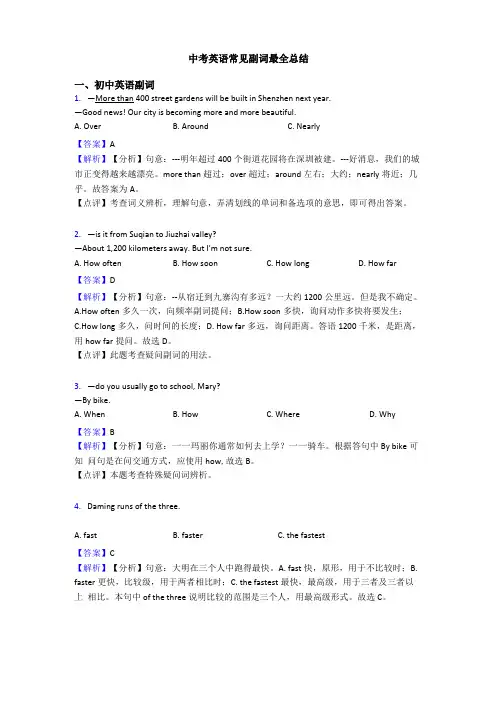
中考英语常见副词最全总结一、初中英语副词1.—More than 400 street gardens will be built in Shenzhen next year.—Good news! Our city is becoming more and more beautiful.A. OverB. AroundC. Nearly【答案】A【解析】【分析】句意:---明年超过400个街道花园将在深圳被建。
---好消息,我们的城市正变得越来越漂亮。
more than超过;over超过;around左右;大约;nearly将近;几乎。
故答案为A。
【点评】考查词义辨析,理解句意,弄清划线的单词和备选项的意思,即可得出答案。
2.—is it from Suqian to Jiuzhai valley?—About 1,200 kilometers away. But I'm not sure.A. How oftenB. How soonC. How longD. How far【答案】D【解析】【分析】句意:--从宿迁到九寨沟有多远?一大约1200公里远。
但是我不确定。
A.How often多久一次,向频率副词提问;B.How soon多快,询问动作多快将要发生;C.How long多久,问时间的长度;D. How far多远,询问距离。
答语1200千米,是距离,用how far提问。
故选D。
【点评】此题考查疑问副词的用法。
3.—do you usually go to school, Mary?—By bike.A. WhenB. HowC. WhereD. Why【答案】B【解析】【分析】句意:一一玛丽你通常如何去上学?一一骑车。
根据答句中By bike可知问句是在问交通方式,应使用how,故选B。
【点评】本题考查特殊疑问词辨析。
4.Daming runs of the three.A. fastB. fasterC. the fastest【答案】C【解析】【分析】句意:大明在三个人中跑得最快。
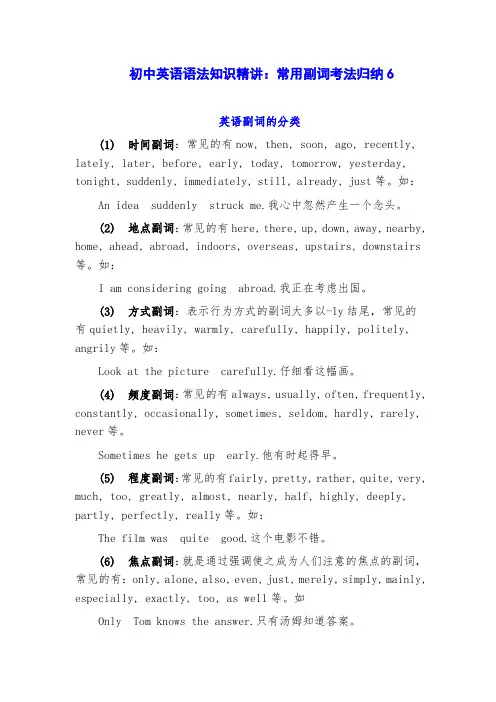
初中英语语法知识精讲:常用副词考法归纳6英语副词的分类(1) 时间副词:常见的有now, then, soon, ago, recently, lately, later, before, early, today, tomorrow, yesterday, tonight, suddenly, immediately, still, already, just等。
如:An idea suddenly struck me.我心中忽然产生一个念头。
(2) 地点副词:常见的有here, there, up, down, away, nearby, home, ahead, abroad, indoors, overseas, upstairs, downstairs 等。
如:I am considering going abroad.我正在考虑出国。
(3) 方式副词:表示行为方式的副词大多以-ly结尾,常见的有quietly, heavily, warmly, carefully, happily, politely, angrily等。
如:Look at the picture carefully.仔细看这幅画。
(4) 频度副词:常见的有always, usually, often, frequently, constantly, occasionally, sometimes, seldom, hardly, rarely, never等。
Sometimes he gets up early.他有时起得早。
(5) 程度副词:常见的有fairly, pretty, rather, quite, very, much, too, greatly, almost, nearly, half, highly, deeply, partly, perfectly, really等。
如:The film was quite good.这个电影不错。
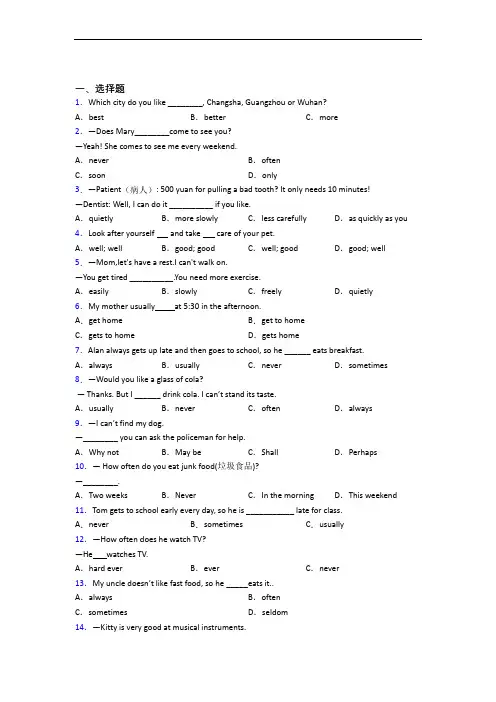
一、选择题1.Which city do you like ________, Changsha, Guangzhou or Wuhan?A.best B.better C.more2.—Does Mary________come to see you?—Yeah! She comes to see me every weekend.A.never B.oftenC.soon D.only3.—Patient(病人): 500 yuan for pulling a bad tooth? It only needs 10 minutes!—Dentist: Well, I can do it __________ if you like.A.quietly B.more slowly C.less carefully D.as quickly as you 4.Look after yourself and take care of your pet.A.well; well B.good; good C.well; good D.good; well 5.—Mom,let's have a rest.I can't walk on.—You get tired __________.You need more exercise.A.easily B.slowly C.freely D.quietly6.My mother usually at 5:30 in the afternoon.A.get home B.get to homeC.gets to home D.gets home7.Alan always gets up late and then goes to school, so he ______ eats breakfast. A.always B.usually C.never D.sometimes 8.—Would you like a glass of cola?—Thanks. But I ______ drink cola. I can’t stand its taste.A.usually B.never C.often D.always9.—I can’t find my dog.—________ you can ask the policeman for help.A.Why not B.May be C.Shall D.Perhaps 10.— How often do you eat junk food(垃圾食品)?—________.A.Two weeks B.Never C.In the morning D.This weekend 11.Tom gets to school early every day, so he is ___________ late for class.A.never B.sometimes C.usually12.—How often does he watch TV?—He watches TV.A.hard ever B.ever C.never13.My uncle doesn’t like fast food, so he _____eats it..A.always B.oftenC.sometimes D.seldom14.—Kitty is very good at musical instruments.—Yes, she is. She can play the guitar almost her guitar teacher.A.as better as B.as good as C.as well as D.so well as 15.—Have you ever been to Brazil?— No, I have________ been there.A.often B.usually C.never16.Lin Tao has a room, but it's not tidy. His toys are________ .A.here B.there C.everywhere 17.—what's the matter with Eric?—He hurt himself ________playing soccer.A.clearly B.happily C.badly D.quietly 18.—Have you ever been to Disneyland?—No, ______. I hope I can go there next year.A.always B.sometimes C.never D.often 19.Li Ming failed the final exam, so he decided to study _______ next term. A.hardly B.hard C.harder D.hardest 20.—Hi, Bob! I can’t find my story book. Have you seen it?—Sorry, I haven’t. Why not ask Jim? Perhaps he’s seen it _____.A.anywhere B.everywhere C.nowhere D.somewhere 21.—Why do you think Sam did _______ than anyone else in the competition?—Because he sang most loudly and _______.A.worse; carefully B.better; clearlyC.worse; quietly D.best; carefully22.Generally speaking, over my career , the harder the course is, ______ I play. A.well B.better C.the best D.the better 23.The children are making too much __________. How __________ they are playing! A.noise; noisily B.noise; noisy C.noisy; noisy D.noisy; noisily 24.These days lots of people are working_________ to get_________ for their living. A.hard enough; enough money B.enough hardly; money enough C.enough hard; money enough D.hardly enough; enough money 25.The poor woman lives _________.But she never feels ________.A.alone; lonely B.lonely; lonely C.alone; alone D.lonely; alone 【参考答案】***试卷处理标记,请不要删除一、选择题1.A解析:A【解析】【分析】【详解】句意:你最喜欢哪个城市,长沙,广州还是武汉?考查副词最高级。
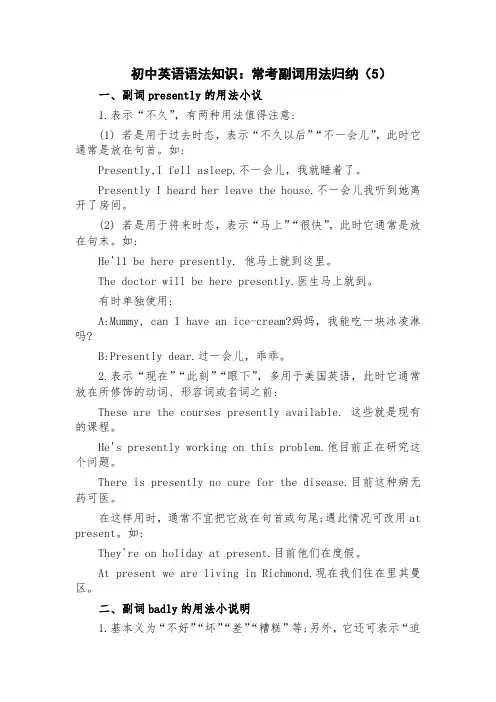
初中英语语法知识:常考副词用法归纳(5)一、副词presently的用法小议1.表示“不久”,有两种用法值得注意:(1) 若是用于过去时态,表示“不久以后”“不一会儿”,此时它通常是放在句首。
如:Presently,I fell asleep.不一会儿,我就睡着了。
Presently I heard her leave the house.不一会儿我听到她离开了房间。
(2) 若是用于将来时态,表示“马上”“很快”,此时它通常是放在句末。
如:He'l1 be here presently. 他马上就到这里。
The doctor will be here presently.医生马上就到。
有时单独使用:A:Mummy, can I have an ice-cream?妈妈,我能吃一块冰凌淋吗?B:Presently dear.过一会儿,乖乖。
2.表示“现在”“此刻”“眼下”,多用于美国英语,此时它通常放在所修饰的动词、形容词或名词之前:These are the courses presently available. 这些就是现有的课程。
He's presently working on this problem.他目前正在研究这个问题。
There is presently no cure for the disease.目前这种病无药可医。
在这样用时,通常不宜把它放在句首或句尾;遇此情况可改用at present。
如:They're on holiday at present.目前他们在度假。
At present we are living in Richmond.现在我们住在里其曼区。
二、副词badly的用法小说明1.基本义为“不好”“坏”“差”“糟糕”等;另外,它还可表示“迫切地”“非常”,但此主要与want. need.be in need of等表示“相要”或“需要”的动词或短语连用。
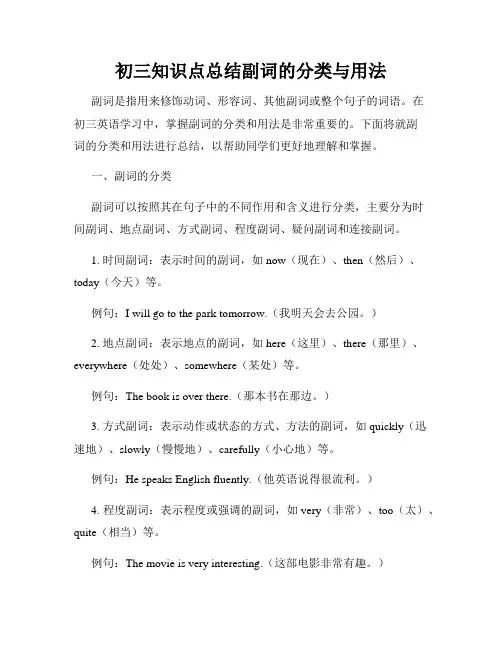
初三知识点总结副词的分类与用法副词是指用来修饰动词、形容词、其他副词或整个句子的词语。
在初三英语学习中,掌握副词的分类和用法是非常重要的。
下面将就副词的分类和用法进行总结,以帮助同学们更好地理解和掌握。
一、副词的分类副词可以按照其在句子中的不同作用和含义进行分类,主要分为时间副词、地点副词、方式副词、程度副词、疑问副词和连接副词。
1. 时间副词:表示时间的副词,如now(现在)、then(然后)、today(今天)等。
例句:I will go to the park tomorrow.(我明天会去公园。
)2. 地点副词:表示地点的副词,如here(这里)、there(那里)、everywhere(处处)、somewhere(某处)等。
例句:The book is over there.(那本书在那边。
)3. 方式副词:表示动作或状态的方式、方法的副词,如quickly(迅速地)、slowly(慢慢地)、carefully(小心地)等。
例句:He speaks English fluently.(他英语说得很流利。
)4. 程度副词:表示程度或强调的副词,如very(非常)、too(太)、quite(相当)等。
例句:The movie is very interesting.(这部电影非常有趣。
)5. 疑问副词:用来引导疑问句的副词,如when(什么时候)、where(在哪里)、why(为什么)等。
例句:When did you finish your homework?(你什么时候完成作业的?)6. 连接副词:用来连接两个句子或短语的副词,如however(然而)、therefore(因此)、besides(此外)等。
例句:She is smart; however, she is not very confident.(她很聪明,然而她不太自信。
)二、副词的用法副词可以用于不同的句子结构和位置,常见的用法有以下几种。
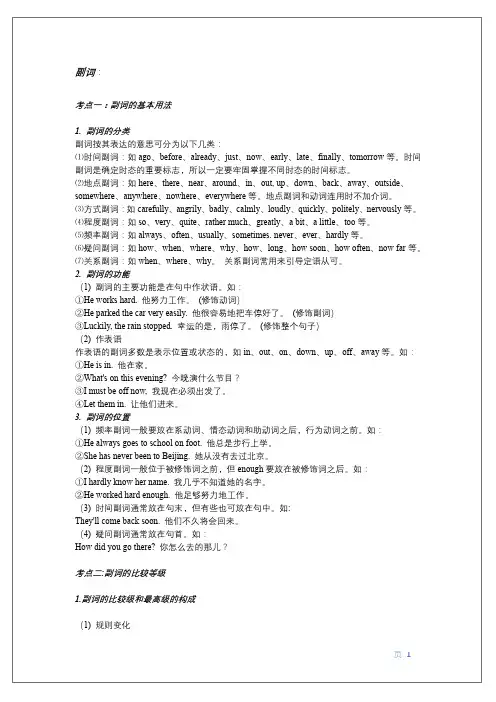
副词:考点一:副词的基本用法1. 副词的分类副词按其表达的意思可分为以下几类:⑴时间副词:如ago、before、already、just、now、early、late、finally、tomorrow等。
时间副词是确定时态的重要标志,所以一定要牢固掌握不同时态的时间标志。
⑵地点副词:如here、there、near、around、in、out, up、down、back、away、outside、somewhere、anywhere、nowhere、everywhere等。
地点副词和动词连用时不加介词。
⑶方式副词:如carefully、angrily、badly、calmly、loudly、quickly、politely、nervously等。
⑷程度副词:如so、very、quite、rather much、greatly、a bit、a little、too等。
⑸频率副词:如always、often、usually、sometimes. never、ever、hardly等。
⑹疑问副词:如how、when、where、why、how、long、how soon、how often、now far等。
⑺关系副词:如when、where、why。
关系副词常用来引导定语从可。
2. 副词的功能(1) 副词的主要功能是在句中作状语。
如:①He works hard. 他努力工作。
(修饰动词)②He parked the car very easily. 他很容易地把车停好了。
(修饰副词)③Luckily, the rain stopped. 幸运的是,雨停了。
(修饰整个句子)(2) 作表语作表语的副词多数是表示位置或状态的,如in、out、on、down、up、off、away等。
如:①He is in. 他在家。
②What's on this evening? 今晚演什么节目?③I must be off now, 我现在必须出发了。
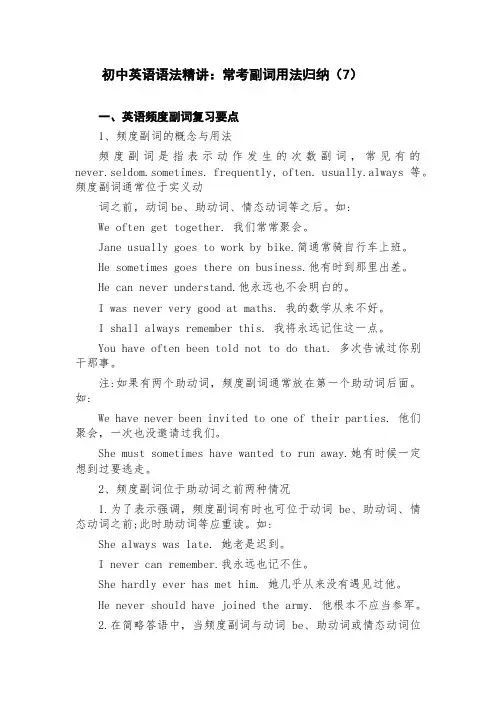
初中英语语法精讲:常考副词用法归纳(7)一、英语频度副词复习要点1、频度副词的概念与用法频度副词是指表示动作发生的次数副词,常见有的never.seldom.sometimes. frequently, often. usually.always 等。
频度副词通常位于实义动词之前,动词be、助动词、情态动词等之后。
如:We often get together. 我们常常聚会。
Jane usually goes to work by bike.简通常骑自行车上班。
He sometimes goes there on business.他有时到那里出差。
He can never understand.他永远也不会明白的。
I was never very good at maths. 我的数学从来不好。
I shall always remember this. 我将永远记住这一点。
You have often been told not to do that. 多次告诫过你别干那事。
注:如果有两个助动词,频度副词通常放在第一个助动词后面。
如:We have never been invited to one of their parties. 他们聚会,一次也没邀请过我们。
She must sometimes have wanted to run away.她有时候一定想到过要逃走。
2、频度副词位于助动词之前两种情况1.为了表示强调,频度副词有时也可位于动词be、助动词、情态动词之前;此时助动词等应重读。
如:She always was late. 她老是迟到。
I never can remember.我永远也记不住。
She hardly ever has met him. 她几乎从来没有遇见过他。
He never should have joined the army. 他根本不应当参军。
2.在简略答语中,当频度副词与动词be、助动词或情态动词位干句末时,频度副词必须前置。
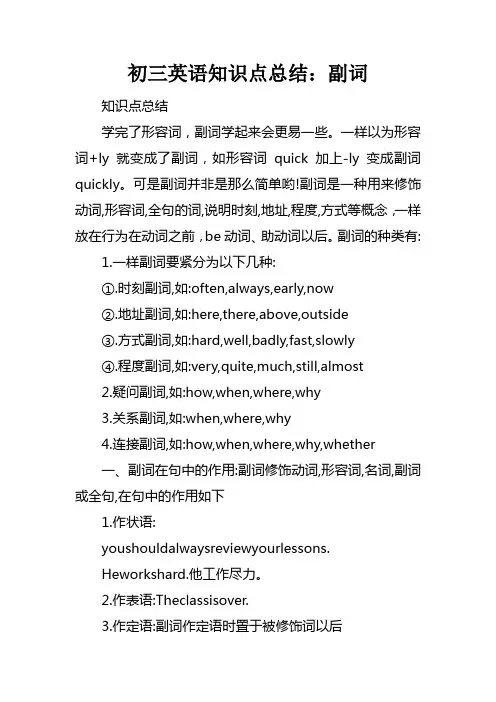
初三英语知识点总结:副词知识点总结学完了形容词,副词学起来会更易一些。
一样以为形容词+ly就变成了副词,如形容词quick加上-ly变成副词quickly。
可是副词并非是那么简单哟!副词是一种用来修饰动词,形容词,全句的词,说明时刻,地址,程度,方式等概念,一样放在行为在动词之前,be动词、助动词以后。
副词的种类有:1.一样副词要紧分为以下几种:①.时刻副词,如:often,always,early,now②.地址副词,如:here,there,above,outside③.方式副词,如:hard,well,badly,fast,slowly④.程度副词,如:very,quite,much,still,almost2.疑问副词,如:how,when,where,why3.关系副词,如:when,where,why4.连接副词,如:how,when,where,why,whether一、副词在句中的作用:副词修饰动词,形容词,名词,副词或全句,在句中的作用如下1.作状语:youshouldalwaysreviewyourlessons.Heworkshard.他工作尽力。
2.作表语:Theclassisover.3.作定语:副词作定语时置于被修饰词以后Thecomradesheregiveusalotofhelp.4.作补语:IfoundallthelightsonwhenIgothomelastnight.二、副词的比较品级:副词和形容词一样,也有它的比较级和最高级形式,而且转变规那么也是一样的。
单音节副词的比较级是在副词后面加上-er组成的,最高级是在副词后面加上-est组成的。
例如:nearnearernearest多音节副词的比较级是在副词的前面加上-more组成的。
最高级是在副词前面加上-most组成的.例如;warmly morewarmly mostwarmly有些副词的比较级和最高级形式是不规那么的:well-better-bestlittle-less-leastmuch-more-mostbadly-worse-worstfar-farther-farthest副词的比较级和最高级用法同形容词的比较级用法大体一样,二者比较用比较级,三者或以上用最高级,可是副词最高级形式句中the能够省略。
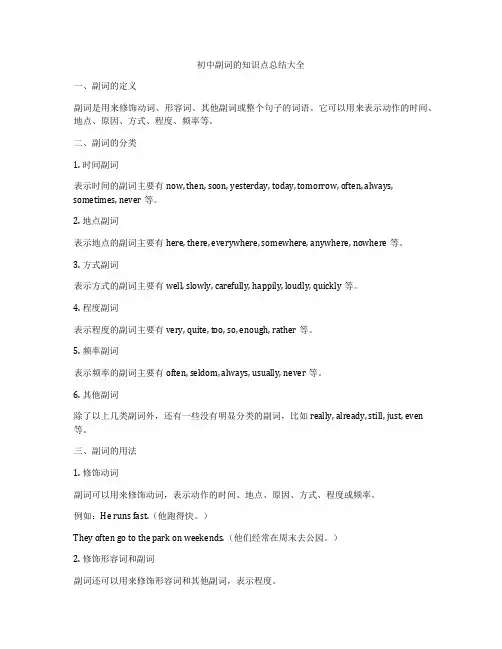
初中副词的知识点总结大全一、副词的定义副词是用来修饰动词、形容词、其他副词或整个句子的词语。
它可以用来表示动作的时间、地点、原因、方式、程度、频率等。
二、副词的分类1. 时间副词表示时间的副词主要有now, then, soon, yesterday, today, tomorrow, often, always, sometimes, never等。
2. 地点副词表示地点的副词主要有here, there, everywhere, somewhere, anywhere, nowhere等。
3. 方式副词表示方式的副词主要有well, slowly, carefully, happily, loudly, quickly等。
4. 程度副词表示程度的副词主要有very, quite, too, so, enough, rather等。
5. 频率副词表示频率的副词主要有often, seldom, always, usually, never等。
6. 其他副词除了以上几类副词外,还有一些没有明显分类的副词,比如really, already, still, just, even 等。
三、副词的用法1. 修饰动词副词可以用来修饰动词,表示动作的时间、地点、原因、方式、程度或频率。
例如:He runs fast.(他跑得快。
)They often go to the park on weekends.(他们经常在周末去公园。
)2. 修饰形容词和副词副词还可以用来修饰形容词和其他副词,表示程度。
例如:She is very beautiful.(她非常漂亮。
)3. 修饰整个句子副词还可以用来修饰整个句子,表示说话人的态度、角度或者整个句子的总体情况。
例如:Hopefully, everything will be fine.(希望一切顺利。
)四、副词的用法注意事项1. 位置副词一般放在被修饰的词语之后,但有时也会放在被修饰的词语之前。
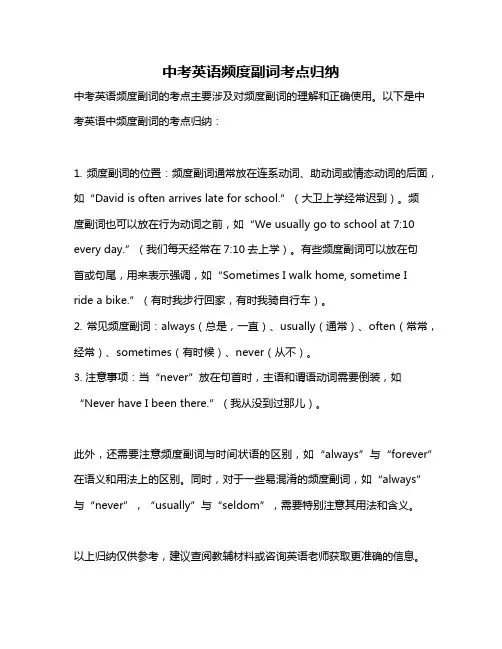
中考英语频度副词考点归纳
中考英语频度副词的考点主要涉及对频度副词的理解和正确使用。
以下是中考英语中频度副词的考点归纳:
1. 频度副词的位置:频度副词通常放在连系动词、助动词或情态动词的后面,如“David is often arrives late for school.”(大卫上学经常迟到)。
频
度副词也可以放在行为动词之前,如“We usually go to school at 7:10 every day.”(我们每天经常在7:10去上学)。
有些频度副词可以放在句
首或句尾,用来表示强调,如“Sometimes I walk home, sometime I
ride a bike.”(有时我步行回家,有时我骑自行车)。
2. 常见频度副词:always(总是,一直)、usually(通常)、often(常常,经常)、sometimes(有时候)、never(从不)。
3. 注意事项:当“never”放在句首时,主语和谓语动词需要倒装,如“Never have I been there.”(我从没到过那儿)。
此外,还需要注意频度副词与时间状语的区别,如“always”与“forever”在语义和用法上的区别。
同时,对于一些易混淆的频度副词,如“always”与“never”,“usually”与“seldom”,需要特别注意其用法和含义。
以上归纳仅供参考,建议查阅教辅材料或咨询英语老师获取更准确的信息。
初中英语副词知识点副词(Adverb 简称adv.)是指在句子中表示行为或状态特征的词,用以修饰动词、形容词、其他副词或全句,表示时间、地点、程度、方式等概念。
下面小编给大家分享一些初中英语副词知识,希望能够帮助大家,欢迎阅读!初中英语副词知识1副词的比较级副词和形容词一样,也有它的比较级和最高级形式. 可以参考形容词的变换形式。
但以词尾 -ly 结尾的副词(除 early )须用 more 和 most 。
单音节副词的比较级是在副词后面加上-er 构成的,最高级是在副词后面加上 -est 构成的。
near nearer nearesthard harder hardest多音节副词的比较级是在副词的前面加上 -more 构成的。
最高级是在副词前面加上 -most 构成的。
有些副词的比较级和最高级形式是不规则的。
well-better - best little - less - leastMuch- more - most badly - worse - worstfar-farther(further)-farthest(furthest)副词的比较级和最高级用法同形容词的比较级用法基本一样。
最高级形式句中 the 可以省略。
He works harder than I.他比我工作努力。
Lucy gets up earlier than Lili.露西比丽丽起床早。
He runs fastest in our class.他在我们班跑地最快。
He dives deeper than his teammates.他比他的队员潜水深。
It's true that he speak English more fluently than any of us.他英语讲的确实比我们任何人都好。
Our school team play football best in our region.我们校队在我们地区足球踢得最好的。
(完整版)副词知识点总结副词知识点总结一、副词的定义副词是一种用来修饰动词、形容词、其他副词或句子的词语。
它可以表达时间、地点、方式、程度、频率等含义。
二、副词的分类及特点1. 时间副词:表示时间,如今天、昨天、明天等。
特点是以-ly 结尾的副词大多可以表示时间。
2. 地点副词:表示地点,如这里、那里、上面等。
3. 方式副词:表示方式,如慢慢地、轻轻地等。
特点是以-ly 结尾的副词大多可以表示方式。
4. 程度副词:表示程度,如非常、很、稍微等。
特点是以-ly 结尾的副词大多可以表示程度。
5. 频率副词:表示频率,如经常、偶尔、从不等。
三、副词的用法1. 修饰动词:副词可以修饰动词,表示动作的方式、程度、频率等。
- 例如:他快速地跑了起来。
2. 修饰形容词或副词:副词可以修饰形容词或副词,表示形容词或副词的程度。
- 例如:她非常漂亮。
3. 修饰句子:副词可以修饰整个句子,表示说话人的态度、观点等。
- 例如:幸运地,我们赶上了最后一班车。
四、常见的副词以下是一些常见的副词及其分类:- 时间副词:今天、明天、昨天、以前、以后等。
- 地点副词:这里、那里、上面、下面等。
- 方式副词:快速地、慢慢地、轻轻地等。
- 程度副词:很、非常、稍微等。
- 频率副词:常常、偶尔、从不等。
五、注意事项1. 部分副词在句子中的位置是固定的,如常放在动词前面、形容词后面。
2. 一些形容词也可以作为副词使用,但在句子中的位置有所不同。
以上是有关副词的知识点总结,希望对您的研究有所帮助!。
初中英语副词的知识点总结副词是英语语法中的一个重要部分,用来修饰动词、形容词、副词或整个句子。
它可以描述时间、地点、方式、程度等,使句子更加丰富多样。
下面是初中英语副词的知识点总结。
1.副词的分类副词可以分为很多种类,常见的有时间副词、地点副词、程度副词、方式副词等。
例如:•时间副词:now(现在)、sometimes(有时候)、always(总是)、often(经常)、never(从不)等。
•地点副词:here(这里)、there(那里)、everywhere(到处)、nowhere(无处)等。
•程度副词:very(非常)、too(太)、quite(相当)、almost(几乎)、rather(相当)等。
•方式副词:slowly(慢慢地)、carefully(小心地)、noisily(吵闹地)、easily(容易地)等。
2.副词的用法副词通常放在动词之前,用来修饰动词。
例如:•He runs quickly.(他跑得快。
)•She sings beautifully.(她唱得很美。
)副词也可以放在句子的末尾,用来表示说话者对某种情况的态度或者陈述事实。
例如:•She is here.(她在这里。
)•I am happy.(我很快乐。
)3.副词的比较等级副词的比较等级也是需要掌握的一部分。
和形容词一样,副词的比较等级分为原级、比较级和最高级。
•原级:表示一般程度或状态。
例如:fast(快)。
•比较级:表示相对程度或状态。
例如:faster(更快)。
•最高级:表示最高程度或状态。
例如:fastest(最快)。
4.副词的注意事项在使用副词时,还需要注意以下几点:•当副词修饰形容词或副词时,一般要在副词前面加上程度副词。
例如:very quickly(非常快)。
•副词的位置也需要注意。
一般情况下,副词放在动词之前,但有些副词可以放在句子的开头或末尾。
例如:She often goes to the park.(她经常去公园。
中考英语语法精讲:副词副词是一般只能位于谓词性成分之前,充当修饰限制成分而不受其他成分修饰限制的词类。
论文在意义的基础上,以副词的语法功能为标准,将《国语》副词划分为否定副词、范围副词、程度副词、时间副词、语气副词、情状方式副词和关联副词七个大类。
同时,每个副词大类内部又根据句法语义特点进行次分类。
一、副词的定义表示行为特征或性状特征的词叫副词(Adverb)。
副词常用来修饰动词、形容词、其它副词或全句,用来说明时间、地点、程度、方式等概念。
例如:The girl works hard.(hard修饰动词work)It is very cold today.(very修饰形容词cold)Mostly Ihave lunch at school.(mostly修饰全句)Look! It's snowing very heavily.(very修饰副词heavily)二、副词的种类常见的副词分类如下:时间副词 today,now,soon,recently,ago,before,since,finally地点副词here,there,up,down,about,inside, outside程度副词very,much,enough,almost,little,still,quite,so,nearly频度副词usually,sometimes,never,ever,always,often,once,seldom方式副词well,fast,slowly,carefully,badLy,hard,quickly,happily疑问副词 how,when,where,why否定副词 no,not,hardly,neither,nor关系副词 when,where,why连接副词yet,so,however,then,how,when,where,whether,why三、副词的用法1.在句子中作状语Tom,quickly picked up his bag and then went to school.汤姆赶快捡起书包,然后上学去了。
副词知识点总结一、副词的分类1. 根据含义的不同,副词可以分为以下几类:程度副词、时间副词、地点副词、方式副词和疑问副词。
2. 程度副词:表示动词或形容词的程度或强度,比如 very, quite, too, enough, almost 等。
3. 时间副词:表示动作或状态的时间,比如 now, then, soon, yesterday, today, tomorrow 等。
4. 地点副词:表示动作发生的地点或者方向,比如 here, there, everywhere, somewhere, in, out, near, far 等。
5. 方式副词:表示动作进行的方式,比如 well, fast, slowly, carefully 等。
6. 疑问副词:用来引导疑问句,比如 where, when, why, how 等。
二、副词的用法1. 修饰动词:用副词来修饰动词,可以表示动作的方式、程度或者时间等,比如 He runs quickly.(他跑得很快。
)2. 修饰形容词:用副词来修饰形容词,可以表示程度或者强调,比如 It's very cold.(天气很冷。
)3. 修饰其他副词:有些副词可以修饰其他副词,比如 very slowly(非常缓慢)、quite well(相当好)等。
4. 修饰全句:一些副词可以用来修饰整个句子,比如 Unfortunately, we missed the bus.(不幸的是,我们错过了公共汽车。
)5. 修饰介词短语:一些副词可以用来修饰介词短语,比如 He walked around the park.(他在公园里徘徊了一圈。
)三、副词的比较级和最高级1. 大多数副词比较级是在其原形后面加上-er,最高级在其原形后面加上-est,比如 quickly (快),比较级是 quicker(更快),最高级是 quickest(最快)。
2. 一些副词的比较级和最高级需要在前面加上 more 和 most,比如 carefully(小心地),比较级是 more carefully(更小心地),最高级是 most carefully(最小心地)。
副词的用法【用法讲解】考试要求:副词的中考要求是:副词的分类和基本用法,副词的比较级和最高级;某些特殊变化的副词的比较级和最高级(well-better-best等);副词的同级比较(as/ so ... as...的用法)及副词在句中的位置。
知识总结:1.副词的分类1)时间副词:ago, already, before, ever, early, late, just, now, once, soon, still, then等2)地点、方位副词:straight, upstairs, downstairs, above, along, around, outside, inside, behind,here,there等3)方式副词:safely, quietly, quickly, politely, loudly, luckily, happily, easily, carefully, slowly, suddenly等4)程度副词:very, only, quite, almost, even, a little, enough, rather, a lot, badly, nearly, further, widely等5)频度副词:never, sometimes, usually, often, always等6)疑问副词:when,where,why,how,how long,how soon,how often,how far等7)关系副词:whom,where,why等2.副词的用法1)修饰动词作状语He walked quietly into his bedroom. 他安静地走进他的卧室。
2)修饰形容词作状语You have a very nice watch. 你有一块非常好看的手表。
3)作表语,位于系动词后How long will she be away? 她要离开多久?4)作定语The people there love peace. 那儿的人们热爱和平。
一、选择题1.My mother usually at 5:30 in the afternoon.A.get home B.get to homeC.gets to home D.gets home2.—Do you often go shopping with your mom, Mike?—You know, most boys ________ go shopping, but I do.A.sometimes B.usually C.hardly3.My sister is too young to_______herself_______.A.look at;good B.look like;well C.look after;good D.look after;well 4.—You’re going to Hong Kong. What are you doing_______?—I’m going sightseeing. It will be ________time in Hong Kong.A.to there; the first B.there; my firstC.in there; my first D.there; my the first5.My mother ________ at five o’clock.A.usually gets B.usually gets upC.gets up usually D.get usually up6.The show is ______, but I don’t have ______ to watch it.A.interested enough; enough time B.interesting enough; time enough C.enough interesting; time enough D.interesting enough; enough time 7.—Does Mary________come to see you?—Yeah! She comes to see me every weekend.A.never B.oftenC.soon D.only8.Li Hua studies very_______ and her English is_______ in her class.A.hardly; good B.hardly; well C.hard; best D.hard; the best 9.—Sarah always asks “Where’s my mother?”.—After all (毕竟), she is _______ three years old. She needs mother.A.then B.always C.only10.Being _______, the novel based upon real-life events sells ________.A.very worth being read; good B.well worth reading; goodC.well worth reading; well D.very worth reading; well 11.—Every student likes Ms. Wang very much.—Yes. She________makes her lessons interesting.A.never B.always C.Sometime 12.—Our volleyball team achieved great success in the match again.—Wow ! Few could play ______, I think.A.better B.well C.worse D.badly 13.—What do you think of Rose?—She’s a lazy girl. She ________ helps her mother do housework at home.A.never B.often C.always14.—How was your trip to the British Museum?—I spoke no English and was _______ silent during the visit.A.completely B.peacefully C.patiently D.carefully15.―What do you think of the TV show Readers hosted by Dong Qing?―Wonderful! I thi nk it is a meaningful TV show that many people like watching it. A.so; so B.so; such C.such; such D.such; so 16.“The new technology is so ________ used in the world!” said Mr. White surprisedly with his eyes wide open.A.wide B.widely C.heavy D.heavily17.With Xu Ming’s help, Zhang Lin does his homework ____ than before.A.more careful B.more carefully C.much careful D.much carefully 18.Suzy felt _________ when she studied __________ in London.A.alone; lonely B.alone; aloneC.lonely; lonely D.lonely; alone19.—Dad, would you please walk a little more ?—Sorry. I thought you could follow me.A.closely B.quickly C.quietly D.slowly20.My uncle doesn’t like fast food, so he _____eats it..A.always B.oftenC.sometimes D.seldom21.—Remember, ________ you do your homework, ________ mistakes you will make. —OK, Mom.A.the more careful; the less B.the more carefully; the less C.the more carefully; the fewer22.Practice makes perfect. You learn to play the piano by practicing. _______, you can’t r eally learn a language well without using it.A.Probably B.Hopefully C.Thankfully D.Similarly23.Lin Tao has a room, but it's not tidy. His toys are________ .A.here B.there C.everywhere24.—Why do you think Sam did _______ than anyone else in the competition?—Because he sang most loudly and _______.A.worse; carefully B.better; clearlyC.worse; quietly D.best; carefully25.—Patient(病人): 500 yuan for pulling a bad tooth? It only needs 10 minutes!—Dentist: Well, I can do it __________ if you like.A.quietly B.more slowly C.less carefully D.as quickly as you【参考答案】***试卷处理标记,请不要删除一、选择题1.D解析:D【解析】句意“我的妈妈通常下午5:30到家”。
my mother为主语,谓语动词用单数gets,排除A和B。
home为地点副词,不加to,即get home。
故选D。
2.C解析:C【解析】【详解】句意:——Mike,你经常和你妈妈一起去购物吗?——你知道,大部分的男孩几乎不去购物,但是我去。
考查频度副词。
A. sometimes有时;B. usually通常;C. hardly几乎不。
根据常识可知,大部分的男孩不喜欢购物,所以几乎不去购物,故选C。
3.D解析:D【解析】【详解】句意:我的妹妹太小了不能照顾好自己。
考查动词短语辨析及形容词、副词辨析。
look at看……;look like看起来像;look after照顾;good好的,形容词;well好,副词。
根据句意可知,这里表示“太小不能照顾自己”,用短语look after;第二个空修饰第一个空的动词短语,应用副词。
故选D。
4.B解析:B【解析】【详解】句意:——你打算去香港。
你在那里做什么?——我去观光。
这是我第一次去香港。
考查介词辨析及序数词。
there那儿,那里,是一个副词,前面不需要加介词,故排除A和C;first是序数词,“第一”,前面须加限定词,my和the都是限定词,两者选其一即可,不能同时都使用。
故选B。
5.B解析:B【解析】【详解】句意:我的妈妈通常五点起床。
考查频度副词的位置。
根据选项中的usually可知,本句为一般现在时。
主语My mother是第三人称单数,谓语动词也要用第三人称单数,排除D项;get up意为“起床”,而A项中的gets不能单独作谓语,排除A项;usually是频度副词,要放在实义动词之前,排除C 项,故选B。
【点睛】常见的频度副词有always,usually,often,never等,通常和一般现在时连用。
频度副词的位置:1.它们常放在系动词、助动词或情态动词之后,如:David is often late for school.2.它们常放在实义动词之前,如:We usually go to school at 7:00.本题中的“gets up”是动词词组,所以频度副词要放在实义动词之前,故选B。